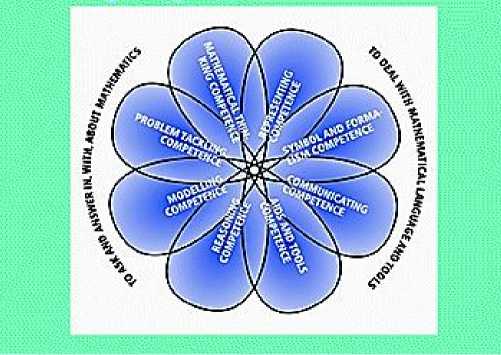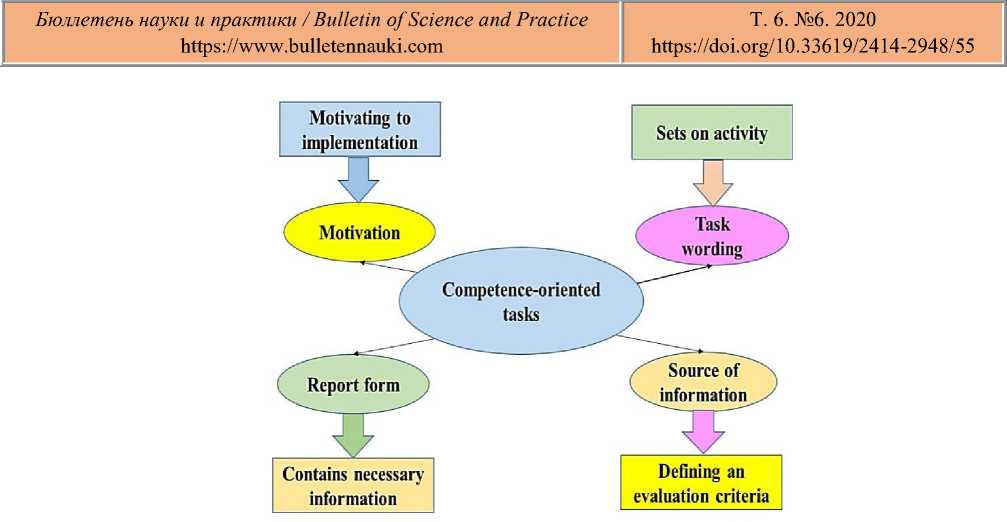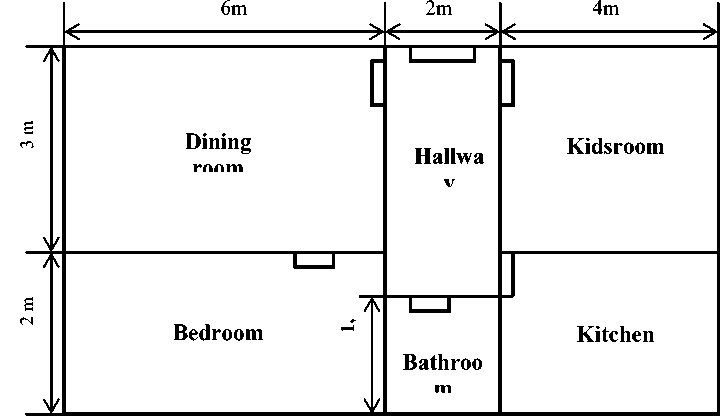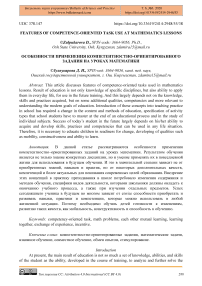Features of competence-oriented task use at mathematics lessons
Автор: Zulpukarova Damira
Журнал: Бюллетень науки и практики @bulletennauki
Рубрика: Педагогические науки
Статья в выпуске: 6 т.6, 2020 года.
Бесплатный доступ
This article discusses features of competence-oriented tasks used in mathematics lessons. Result of education is not only knowledge of specific disciplines, but also ability to apply them in everyday life, for use in the future training. And this largely depends not on the knowledge, skills and practices acquired, but on some additional qualities, competencies and more relevant to understanding the modern goals of education. Introduction of these concepts into teaching practice in school has required a change in the content and methods of education, specification of activity types that school students have to master at the end of an educational process and in the study of individual subjects. Success of today’s student in the future largely depends on his/her ability to acquire and develop skills, practices and competencies that can be used in any life situation. Therefore, it is necessary to educate children in readiness for change, developing of qualities such as mobility, constructiveness and ability to learn.
Competency-oriented task, math problems, each other mutual learning, learning together, exchange of experience, incentive
Короткий адрес: https://sciup.org/14116277
IDR: 14116277 | УДК: 378.147 | DOI: 10.33619/2414-2948/55/38
Текст научной статьи Features of competence-oriented task use at mathematics lessons
Бюллетень науки и практики / Bulletin of Science and Practice
UDC 378.147
At present, the main result of education is not so much a set of knowledge, abilities, and skills of the student as the ability, developed in the course of training, to analyze and further solve the problem under prevailing conditions, during which a stock of existing knowledge and skills from various subject areas is attracting. A new result of education, which students should have, is called competence. The concept of competence was studied from the point of education semiotics, which claimed that it is a central key concept when we are trying to analyze the meaning of education [1]. Students’ proficiency obtained in mathematics subjects and their grades from the previous school years can perceive cognitive activation, support from teachers of their basic psychological needs most strongly predicted student initial status and growth in accounting competence [2].
If competence is the ability to apply accumulated knowledge in practical activities and everyday life, then the competence-oriented tasks [3] are intending for the realization of these goals as incompetency flower which was represented in Figure 1.
The purpose of competency-oriented assignments is to dip students into the solution of the vital task. Therefore, for the formation of these competencies, it is appropriate to use competence-oriented tasks: firstly, as an activity task, secondly, for simulation of practical skills, life situation, thirdly, it is built on the actual material for the student. Fourthly, its structure set by an objective formulation that contains a personally significant cognitive question - action. For example study; use; identify; finish; explain; find; find out.
The competency flower

Competency-oriented assignments and tasks
Mathematical-task [4] knowledge for teaching deals with the knowledge teachers need in order to (a) select and develop tasks to promote students’ conceptual understanding of mathematics, support their development of mathematical thinking, and capture their interest and curiosity and (b) optimize the learning potential of such tasks. This knowledge includes as follows:
Aspects of these key competencies are being formed during the teaching procedure and its feedback analysis. A stimulus was indicated (if ..., then ...). The stimulus motivates students to perform the task, also it was noted that if the stimulus is easily recognizable, the older a child is the more he will attend to the stimulus features that are critical for task performance [10]. The stimulus should be short (no more than three sentences) and do not distract the student from the content of the assignment. The source of information regarding this issue (text, table, graph, statistics, etc.) was indicated and the verification tool was defined. In modern textbooks, there are few competence-oriented tasks, but on the basis of available assignments, it is possible to develop students' own tasks that form certain competencies. Often the same task contributes to the creation of conditions for the formation of several key competencies. Recent research results are suggesting that executive function skills, which include monitoring, manipulating information in mind (working memory), suppressing distracting information and unwanted responses (inhibition), and flexible thinking (shifting), play a critical role in the development of mathematics proficiency [11].
Competence - is the willingness (or ability) of students to use acquired knowledge, training skills, as well as ways of working in life to solve practical and theoretical problems. In connection with the practical orientation o modern education, the main result of the activity of an educational institution should not be a system of knowledge, skills, and skills in it, but a set of key competencies. Competence beliefs in mathematics, as well as the value given to this subject, are good predictors of achievement-related behaviors, and self-perceptions like competence beliefs have a direct positive effect on value achievement behaviors [12]. From the position of the competence approach, the main result of the activity is the formation of key competencies.
Various approaches to set key competencies were considered, where it is possible to single out the main ones that are considered necessary to be formed in the lessons of mathematics in schools: information (readiness to use information resources, that is, the ability to make reasoned conclusions); communication (readiness for social interaction, ability to receive necessary information in a dialogue); research (readiness to solve problems and readiness for self-education). Key competence means the ability of schoolchildren to act independently in a situation of uncertainty when solving actual problems for them. The introduction of a competence approach to the educational process requires a change in the organization of the lesson. Change the organization of the lesson allows for competence-oriented assignments. Relationship between the competence -oriented task and personally significant cognitive question — action is shown in Figure 2.

Figure 2. The task formulation contains a personally significant cognitive question-action
Competence approach puts forward not the school students’ knowledge, but their ability to organize their work. Difference between the competency-based approaches and traditional approaches was given in Table 1.
Table 1.
DIFFERENCES BETWEEN TRADITIONAL
AND COMPETENCE-BASED APPROACHES IN EDUCATION
|
Traditional approaches |
Competence-based approaches |
|
Main idea: knowledge leads to the personal success |
Main idea: self-solving of problems leads to personal success |
|
Problem solving is considered as a way to consolidate knowledges |
Problem solving is the meaning of educational activities |
|
A sign of high education level is ability to reproduce a large volume of material of a complex |
Education level of a person is the higher, the wider the scope of activity and the higher the degree of uncertainty of situations in which he is able to act independently |
The difference between traditional and competence-based approaches in mathematical education can be explained by the following criteria:
-
1) Forms in school students not only theoretical thinking but also practical, which is aimed for the transforming of actions.
-
2) Focuses on practical actions and solving real problems such as problem situations, workshops, presentations, experiments, etc.
-
3) When organizing the training, the teacher acts as a consultant.
-
4) School students are active and realizing that result of training depends on his/her work.
-
5) The role of self-assessment and peer review is increasing.
-
6) Multi-level control in the evaluation of results (ability to apply obtained knowledge in a new situation).
Features of competence-oriented task
Distinctive features of a competence-oriented task are an imitation of life situation, activity component; educational character, adaptation to the age level of students; subject skills; going beyond one educational area; the presence of a significantly larger set of data, in comparison with ordinary learning tasks, among which there may be extra ones; some of the required data is missing; it is assumed that students should independently find them in the reference literature.
To form a readiness for self-education, students should be asked to independently study some theoretical material, write an essay, or compose a task, and etc. Often the same task contributes to the creation of conditions for the formation of several key competencies. So, the only way out for implementing the competence approach through tasks for school teachers is to compile competence-oriented tasks.
To promote the formation of key educational competencies in students is the systematic application of competence-oriented tasks in the lessons of mathematics. When solving a competence-oriented task, students carry out such activities: teaching, mutual learning, joint study, joint discussion, research (including joint studies), exchange of experience, design, programming of individual educational software.
Competencies are those tasks that meet the following requirements:
-
- Task requires moving from the reproduction of a known sample to an independent replenishment of knowledge;
-
- Task requires search and development of new approaches that have not been studied before to analyze an unfamiliar problem or a situation that requires a decision in a situation of uncertainty, while the resolution of a problem or situation can have practical significance, or be of personal, social and cognitive interest;
-
- The task involves the creation of a written or oral coherent statement, for example, a textdescription or a text-reasoning, an oral or written conclusion, a commentary, an explanation, a description, a report, a formulation and a substantiation of a hypothesis, a message, an appraisal opinion, a reasoned opinion, a call, instructions, etc., with the given parameters such as subject, communicative task, volume, or format;
-
- The task assumes a reasonable and justified use of information technology in order to increase the efficiency of the process of forming all key skills. The analysis of many textbooks in the main school shows that the vast majority of the tasks assigned to them are study assignments and textual tasks. There are few practical and problematic tasks, and there are practically no competence-oriented tasks. Drawing up the same competence-oriented tasks is rather laborious. Therefore, teachers rarely use them in class.
Levels of competence-oriented task
Now we will consider specific tasks and, for starters, we will single out three main levels of competence-oriented tasks:
-
1) Playback level (includes a reproduction of mathematical facts, methods, and calculations). For example, students can apply basic knowledge in standard, clearly articulated situations. They can solve single-step text problems, understand simple dependencies, a standard notation system, can read and interpret data presented in tables, on charts, maps, and various scales.
-
2) Level of establishing links (includes the establishment of links and the integration of material from different mathematical topics needed to solve the task). Students can apply their knowledge in a variety of difficult situations. They can order, correlate, and perform calculations, solve multi-step text problems. Students can perform simple tasks, including the formulation of expressions, the solution of systems of linear equations; determine the values of quantities using known formulas. They can interpret information presented in the tables and on the charts.
-
3) Level of reasoning (mathematical reflections that require generalization and intuition). Students can organize information, generalize, solve non-standard problems, draw conclusions based on the initial data, and justify them. They can calculate changes in available data related to interest, apply knowledge of algebraic concepts and dependencies, and compile an algebraic model of a simple situation. They can interpret the data in different tables and graphs. Let us consider
examples of compiling competence-oriented tasks using the tasks from the textbook. Now let us look at typical tasks for the 5th grade:
Task 1: Three stories are occupying 34 pages. The first story is taking 6 pages; second story is taking pages 3 times smaller than the third story. How many pages does the second story take? This task is not a competence-oriented task. However, if we add a question "Construct a pie chart representing the distribution of pages by books (in percentages)" to the condition of the problem, it will convert to a competence-oriented task.
Task 2: Each class has 32 meters of wire, which need to be designated on the ground border of the flowerbed. The shape of the flowerbed is suggested to be selected from the following options:
Step 1. Circle the word ”Yes” or ”No” in the table beside each of the flowerbed form, depending on whether or not the participants have enough 32 meters of wire to indicate its boundary. The shape of the flowerbed is enough to have 32 m of wire to mark the border of the flowerbed.
Form A — yes/no
Form B — yes/no
Form C — yes/no
Step 2. Specify the dimensions of the flowerbed sides in the drawing, if it is known that 32 meters of wire has gone to their marking. Write down the dimensions of the sides. Remember that only 32 meters of wire is assigned to the layout of each flowerbed. Verification tools:
Evaluation: For each correct answer — 3 points will be given. For correctly sized sides — 5 points will be given. For performance of the creative task - 10 points will be given. The maximum score: 24. When starting a task, the student has to: a) carefully read the task wording; b) examine the form for filling.
In the process of work, the student has to demonstrate the following skills:
-
1) Knowledge of the formula for finding the perimeter
-
2) To find the perimeter of the polygon
-
3) To argue his/her choice
By this way, learning task turns into competence-oriented type. Tasks from the textbook can be used as a basis for competence-oriented tasks. In case of independent compilation of competence-oriented tasks, it is necessary to take into account the following criteria:
-
- Volume of texts should be reasonable
-
- Age and gender characteristics of school students
-
- Prohibition of use not in verbs
-
- Prohibition of the use of software in the sources
-
- Prohibition of using the same type of tasks in one text.
Task 3: The Aliyev family decided to repair the floors in their apartment, it was also decided that their expenses for the repair of the floor should not exceed 20,000 rubles. Using the suggested sources, make the necessary calculations, draw a conclusion and give practical recommendations to the family, supported by mathematical calculations and containing explanations as to why this recommendation should be used. Firstly, the Aliyevs decided to draw an apartment plan (Figure 3), making the necessary measurements, then purchase materials for repair of the floor in the apartment (Tables 1, 2).

Figure 3. Apartment plan
Table 2.
|
COST OF WORK |
|||
|
Room |
Material Cost of work per hour (in rubles per person) |
||
|
Living room |
parquet |
70 |
|
|
Bathroom |
tile |
60 |
|
|
Bedroom |
linoleum |
45 |
|
|
Kidsroom |
linoleum |
45 |
|
|
Kitchen |
linoleum |
45 |
|
|
Hallway |
paint |
30 |
|
|
COST OF MATERIALS |
Table 3. |
||
|
Material |
Quantity |
Color |
Cost |
|
Wallpapers |
1 roll |
250 rubles |
|
|
Paint |
1 can (3 kg) |
white |
180 rubles |
|
Paint |
1 can (3 kg) |
blue |
150 rubles |
|
Paint |
1 can (3 kg for painting of floor 10 m2) |
brown |
140 rubles |
|
Celling cover |
1 m2 |
55 rubles |
|
|
Celling cover |
1 m2 |
75 rubles |
|
|
Tile |
1 m2 |
225 rubles |
|
|
Border |
1 roll |
120 rubles |
|
|
Plinth |
1 m |
45 rubles |
|
|
Parquet |
1 m2 |
550 rubles |
|
|
Linoleum |
1 m2 |
190 rubles |
|
|
Wallpaper glue |
1 упаковка |
75 rubles |
|
|
ceiling glue |
1 can |
65 rubles |
|
|
putty |
1 can |
45 rubles |
|
At the council of the family, it was decided to lay parquet in the living room, linoleum in the bedroom, in the nursery and in kitchen. To do this, they need to calculate how much materials need to be purchased and how much money they will spend on it. To perform the repair, it was decided to contact the firm "Repair of apartments" and hire a brigade of 2 people.
This team can lay parquet in a room for 5 days, if it will work for 5 hours a day, lay linoleum in one room for 2 days, if it will work for 5 hours a day, put tiles in a bathroom for 2 days, by working 5 hours a day, and paint the floors in one room for 2 days.
A typical exercise from a textbook of algebra for Grade 8: Solve a system of equations
(Зх + 5 у = 13,
(Эх — 5 у = —7.
For adding a task, choose the most suitable solution for this equations system from the proposed ones (substitution method, addition method, method of introducing a new variable, graphical method). Justify your choice, so the learning task turns into competence-oriented. Thus, tasks from the textbook can be used as a basis for the competence-oriented task.
During self-compiling of the competence-oriented tasks, it is necessary to consider the following:
-
- The volume of texts should be reasonable;
-
- Taking into account an age and gender characteristics of school students;
-
- A ban on the use of non-verbs;
-
- Prohibition of using program material in sources;
-
- Ban on the use of similar tasks in one text.
Most often, the competence-oriented tasks are used in lessons, and can also be offered as homework. They can be used in the lessons of various types: the study of new material, consolidation of obtained knowledge, in integrated applications of knowledge, in synthesis and systematization of knowledge, in control, in evaluation and correction.
Conclusions
Most often, competence-oriented tasks are used in lessons, and they can also be offered as homework. They can be used in different types of lessons: a study of new material, consolidation of knowledge, integrated application of knowledge, generalization and systematization of knowledge, monitoring, evaluation, and correction. The application of competency-oriented tasks allows solving the problem of better assimilation of knowledge on the subject and the ability of their application in practice. Experience shows that the use of competency-oriented tasks in the lessons of mathematics promotes awareness of the role of mathematics in the modern world, the application of mathematical knowledge to solve problems, evaluate new experiences, and control the effectiveness of their actions.
Conflict of interest
There are no conflicts of interest in publication of this article.
Список литературы Features of competence-oriented task use at mathematics lessons
- Pikkarainen E. Competence as a key concept of educational theory: A semiotic point of view // Journal of Philosophy of Education. 2014. V. 48. №4. P. 621-636. DOI: 10.1111/1467-9752.12080
- Helm C. Determinants of competence development in accounting in upper secondary education // Empirical Research in Vocational Education and Training. 2015. V. 7. №1. P. 10. DOI: 10.1186/s40461-015-0022-8
- Niss M., Bruder R., Planas N., Turner R., Villa-Ochoa J. A. Conceptualisation of the role of competencies, knowing and knowledge in mathematics education research // Proceedings of the 13th International Congress on mathematical education. Springer, Cham, 2017. P. 235-248. DOI: 10.1007/978-3-319-62597-3_15
- Chapman O. Mathematical-task knowledge for teaching // Journal of Mathematics Teacher Education. 2013. V. 16. №1. P. 1-6. DOI: 10.1007/s10857-013-9234-7
- National Council of Teachers of Mathematics. Commission on Teaching Standards for School Mathematics. Professional standards for teaching mathematics. Natl Council of Teachers of, 1991.
- Croft A., Coggshall J. G., Dolan M., Powers E. Job-Embedded Professional Development: What It Is, Who Is Responsible, and How to Get It Done Well. Issue Brief. National Comprehensive Center for Teacher Quality. 2010.
- Implementing standards-based mathematics instruction: A casebook for professional development / ed. by M. K. Stein. Teachers College Press, 2000.
- National Council of Teachers of Mathematics. Commission on Teaching Standards for School Mathematics. Professional standards for teaching mathematics. Natl Council of Teachers of, 1991.
- Midgett C. W., Eddins S. K. NCTM's Principles and Standards for School Mathematics: Implications for Administrators // NASSP Bulletin. 2000. V. 85. №623.
- Greabell L. C. The effect of stimuli input on the acquisition of introductory geometric concepts by elementary school children // School Science and Mathematics. 1978. V. 78. №4. P. 320-326.
- DOI: 10.1111/j.1949-8594.1978.tb09367.x
- Cragg L., Gilmore C. Skills underlying mathematics: The role of executive function in the development of mathematics proficiency // Trends in neuroscience and education. 2014. V. 3. №2. С. 63-68.
- DOI: 10.1016/j.tine.2013.12.001
- Chouinard R., Karsenti T., Roy N. Relations among competence beliefs, utility value, achievement goals, and effort in mathematics // British journal of educational psychology. 2007. V. 77. №3. P. 501-517.
- DOI: 10.1348/000709906X133589


